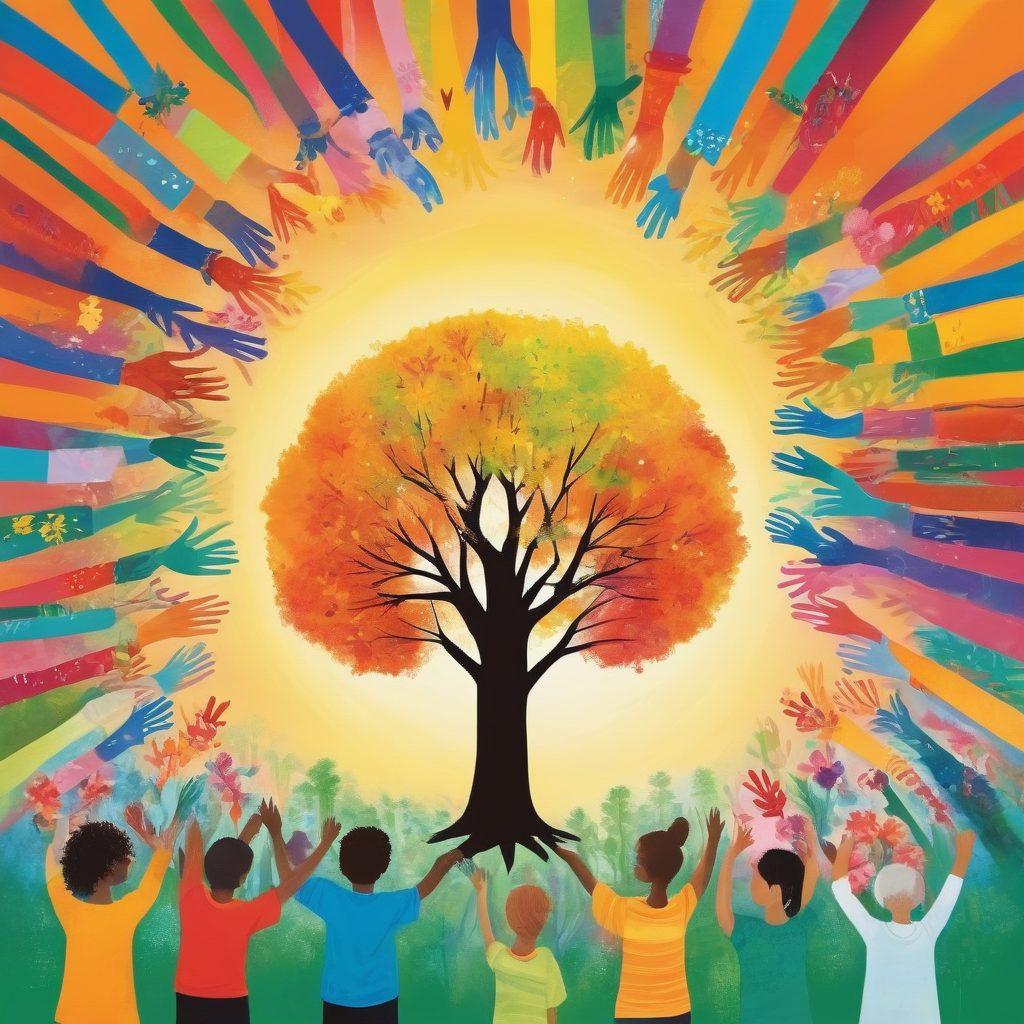Embracing Neurodiversity: Strategies for Joyful Living and Empowerment in Autism Advocacy
In the heart of autism advocacy lies a crucial element: fostering joyful connections. When we talk about autism, too often the conversation gravitates towards challenges and disabilities. However, what if we shifted our perspective? What if we reframe our approach and focus on joy, connection, and the boundless potential within each individual? This shift in mindset can open the doors to a vibrant community of support, where everyone—autistic individuals, families, educators, and supporters—feels welcomed and celebrated. After all, isn't it the shared smiles and cheerful moments that truly define our sense of belonging?
Imagine entering a room buzzing with laughter and warmth. It's a gathering of families touched by autism; each person is not merely present but thriving. Here, autism advocacy is not a somber discussion of statistics but a jubilant celebration of neurodiversity. This nurturing environment cultivates empathetic understanding and encourages relationships that thrive on positivity. By emphasizing social skills development and emotional connections, we can collaboratively create spaces where both the young and the young at heart feel delighted and supported in their journey. How can we extend that joy beyond gatherings and into our daily lives?
As enthusiastic advocates, we have the chance to reshape autism education into an experience that is as enriching as it is informative. When we integrate joyful learning into our curricula, we unlock the potential for health and happiness. Whether through engaging classroom activities that emphasize autism acceptance or creating playful opportunities for autistic empowerment, the focus should always remain on uplifting spirits while fostering essential skills. What strategies can we implement to keep the atmosphere cheerful and engaging?
Community support is vital in this endeavor. It ties families together and builds strong networks that enhance mental wellness. Imagine the power of a neighborhood filled with understanding and awareness! Each act of kindness, whether it’s a neighbor helping out with autism assistance or local organizations hosting cheerful events, solidifies a foundation of inclusivity. We must ask ourselves: how can we create more of these opportunities for connection among diverse groups?
Ultimately, fostering joyful connections in autism advocacy is a commitment to overall well-being—both for the individuals living with autism and the community supporting them. It’s about crafting environments that embrace inclusive practices and promote a positive outlook toward neurodiversity. Let's champion cheerful experiences and memorable moments, one smile at a time. How can we each become ambassadors of joy and compassion within our own circles? This journey into joyful living is not just beneficial; it's transformative and essential in creating a brighter, more accepting world for all.
Empowering Autistic Voices: Strategies for a Cheerful Community
In a world that often seems dominated by a single narrative, the movement for neurodiversity is a refreshing breeze, particularly in the realm of autism advocacy. This movement isn't just about acceptance; it's a celebration of different minds and the beautiful diversity they bring. Imagine a community where every individual, especially those on the autism spectrum, feels delighted and empowered to share their unique perspectives. How can we come together to build this cheerful community? Let's explore the strategies that make a significant impact in empowering autistic voices, fostering joyful connections, and ensuring everyone feels content and validated.
At the heart of empowering autistic voices is the recognition that each individual has their own unique story, experiences, and talents. Think of the magnificent tapestry woven from countless threads, each representing a life filled with potential and uniqueness. Instead of focusing solely on the challenges associated with autism, let’s shift the dialogue to highlight strengths and achievements. For instance, children with autism may excel in certain areas, such as art, music, or technology. By honing in on these talents, we can create opportunities for social skills development, leading to a more positive outlook on their abilities. After all, who doesn’t love to smile when they see someone shine?
Community support plays a crucial role in facilitating autism education and acceptance. It's about creating an environment where families, educators, and peers work hand in hand, fostering understanding and empathy. Imagine hosting a community event where autistic individuals can showcase their talents and skills. Such events not only bring awareness to autism advocacy but also allow for valuable interactions that break down barriers between different groups. What if we could eradicate misconceptions and replace them with an empathetic understanding of neurodiversity? A cheerful community is one where everyone feels included, valued, and joyful.
Inclusive practices are essential in schools and workplaces, where we want to nurture an atmosphere that promotes overall well-being and mental wellness for all individuals. Educational institutions can implement special education programs tailored for diverse learning styles, enriching the educational experience for autistic students. What if instead of mere compliance, we embraced an educational philosophy centered on collaboration and respect for differences? Picture classrooms filled with diverse minds working together, sharing ideas, and supporting one another's growth. When autistic individuals feel understood and empowered, it creates ripples of happiness that extend beyond the classroom walls.
Ultimately, the goal of autism advocacy should be to uplift and celebrate autistic empowerment. Encouraging individuals to express their thoughts, wants, and needs is paramount. In doing so, we nurture a sense of agency and autonomy that leads to joyous living. How can we foster this kind of environment within our homes, schools, and communities? Simple! Start conversations and listen actively. Engage with the autistic individuals in your life, validate their feelings, and support their passions. As we embrace neurodiversity together, we contribute to a movement that not only enriches our communities but also ensures that every voice is heard, every story is valued, and every individual feels delighted in their existence.
Cultivating Well-Being: Embracing Neurodiversity for Happiness and Growth
In a world increasingly focused on diversity and inclusion, the spotlight on neurodiversity is not just welcome; it is essential. The concept of neurodiversity recognizes that individuals like those with autism have unique brain wiring, resulting in varied ways of thinking, feeling, and interacting. If we shift our perspective and embrace this diversity, we can cultivate an environment that is not only accepting but also joyful, cheerful, and conductive to overall well-being. Can you envision a community enriched by empathetic understanding, where each individual is empowered to thrive?
Think about the cheerful moments in your life—those times when you felt delighted, content, or even simply smiling at the smallest joys. For individuals on the autism spectrum, these joyful moments could be connected to their interests, strengths, and the acceptance they experience in their surroundings. Autism advocacy isn't just about raising awareness; it's about creating an atmosphere where everyone can grow and flourish. How can we cultivate this kind of well-being? Through autism education and community support, we can learn to appreciate the unique gifts and perspectives each person brings to the table.
The journey to autism acceptance begins with understanding and embracing those we may not relate to at first glance. Imagine engaging with someone who loves to share their knowledge of planets or trains in an enthusiastic way. Instead of finding it strange, we can celebrate their passion! Learning social skills development strategies and practicing inclusive practices in our interactions can help bridge the gap between differing communication styles, enhancing not just individual relationships, but overall community wellness.
Incorporating strategies that promote mental wellness is crucial in supporting both autistic individuals and their families. Consider establishing a routine that fosters both independence and togetherness, or creating safe spaces where individuals can express themselves freely without fear of judgement. This not only supports health and happiness but also contributes significantly to their feeling of belonging. With autism assistance programs and mentorship opportunities, we can help individuals navigate the complexities of social situations, encouraging their unique talents and perspectives to shine.
As we advocate for autism acceptance and understanding, let’s always remember the power of joy in the process. It's often said that happiness blooms in the garden of community support. Together, we can plant seeds of acceptance, nurturing an inclusive environment that leaves everyone smiling—where every child, regardless of their neurodiversity, has the freedom to thrive. The quest for joyful living, coupled with focused autism advocacy, is not merely a mission; it’s a shared journey toward compassion and camaraderie that can lead to an uplifting future for all.


